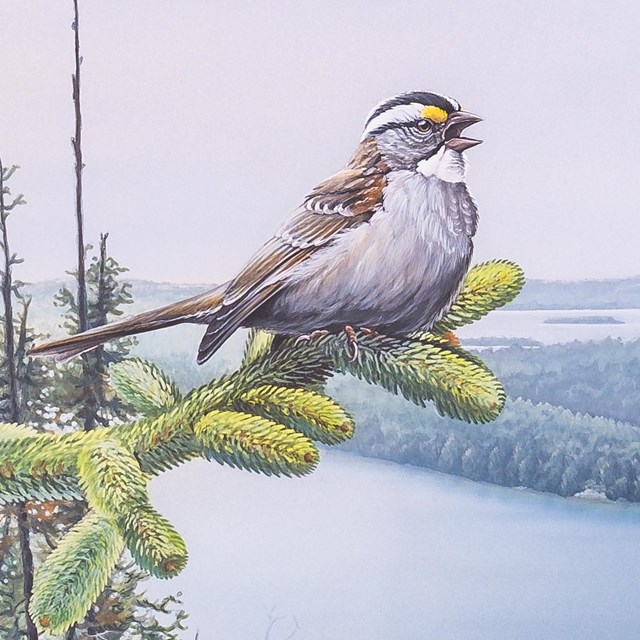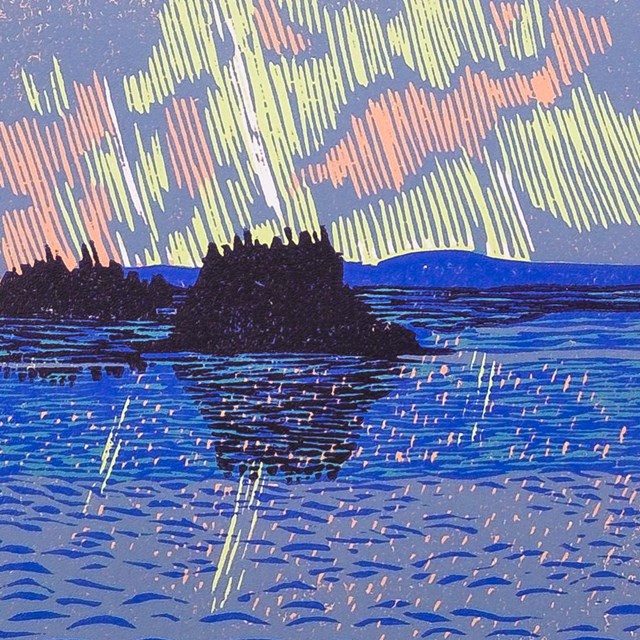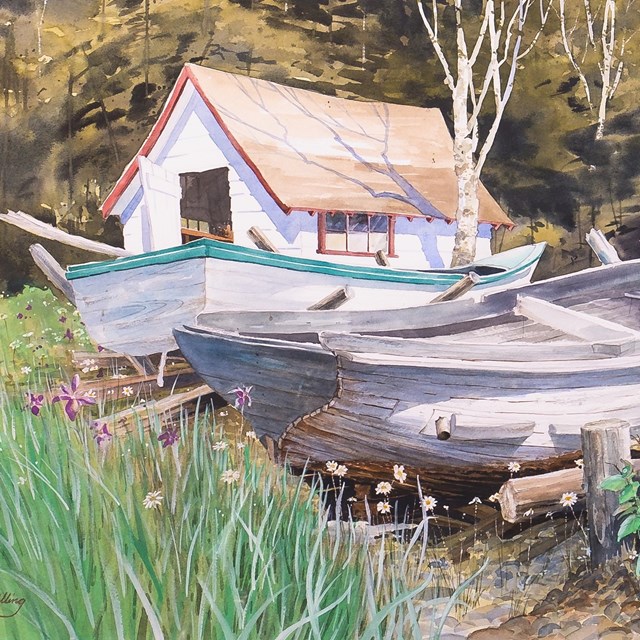|
The ship cut the fog with an immaculate prow,
its funnel unfurling a banner of coal smoke, the captain sounding the foghorn’s growl until the hull rivets rattled. It was the Booth Line steamer, carrying her tourists in celluloid collars and impractical hats, cases of beer, eggs, week-old newspapers, the Norwegian mail-- and receiving in turn, on beds of January, the gutted lake trout with their still-luminous eyes. At the railing, a young man from Kansas shivered in his summer jacket watching the island make itself out of mist -- a shoreline jagged as the jaws of a muskellunge. Something swirled in his blood which he would remember. On a spit pointing into the summer weather, out of island timber he would raise this low roofline, mix this mortar, stack the heavy beach cobbles into a chimney, and caulk these windows framing the blue cove where the mergansers bobbed in the surf. He would spend the long summer daylight in conversation with water and wind, desiring nothing but blueberries on the ridges, and a lake trout on his line. Beyond the horizon, like clouds of locusts men fell upon the earth. A thousand factories bellowed. But here the moon would wax and wane on a quiet schedule and the thimbleberries would blossom. He could bring his family. They would play cribbage by kerosene light. They would burn fragrant cedar logs and stand out on the point, watching the pulse of the Passage Island light. Staring out the window as evening descends
on the scarred wall of ancient basalt whose scrivened edge is repeated in the blue hush of the bay where a lone merganser, out fishing late, pecks at the rising moon, I am listening to my portable radio beside the sink, which is playing, a Bach concerto, one of those 18th-century assertions that the hand of divinity works behind the world’s evident sorrow, spinning the wheels-within-wheels of a Baroque order. My own hands are washing the dishes-- before this panorama of luminous water and dark pines and fading sky, it seems a priestly task, an ablution to help the evening summon its firefly stars. But despite my domestic happiness, despite the harmonies caught in the longwave bands of Canadian public radio, a day’s reading in geology provides the counter-point: all nature is disorderly, follows no template, is utterly unlike a harpsichord’s flourish. There is no theme, no melody, only notes picked out on random instruments: vulcanism, salt chemistry, the deposition of alluvia, the arrival of vascular plants, mere entries in a material sequence. Even these hands, these nets of articulated bone, are no more blessed or blessing than that prow of stone, outweathering all opinions, now bared to the battered moon. The music filters out of the speaker into the northern twilight, where the myrtle warbler tends her careful nest by the cabin eave. I can see that the stars are incomprehensibly distant, and I can see that there might be a super-human grandeur or at least a dignified pathos to our longing for order and our capacity to weave it so delicately out of the empty air. Along the transverse ridges
of lichen-encrusted basalt so old it bears no memory of life, rock that boiled out of livid fissures and hardened, and sank beneath its own massiveness, was thrust up sideways, worked by frost and wave, then scoured clean of all alluvia by the glittering wall, miles high, out of Canada -- after all that fire and ice, that lonely history, here, on a day at the end of July, as the south-tilting slope absorbs the summer heat, among hawkweed and harebell the berries of summer ripen; we pick them and eat them, we savor their brief fragrance. On the meadow above the butt of McCargoe Cove
the wild thyme brings the scent of the Mediterranean to island bees, who drowze in its purple flowers. The log buildings burned in the fire of ‘36 long after the mine had closed and the miners left with their helmets and jackdrills for richer veins, more hospitable latitudes. The tracks were torn up for scrap in 1918. The rest is swallowed in forest. Only the shafts remain, dank and dripping, and this gentle herb, escaped from the company garden to bloom year after year beside boreal flowers: a classical reference, seasoning the wilderness. The ledge, tipped out of the glacial waters,
brilliant with lichen and harebells, may be a lesson in natural history, or an elegant composition, but if the latter, may not be deduced from principles as beauty must always be purposeless, to be perfect, and the sign of our analysis will be our perfect joy. If the dead cedar on the stone shore is scribbled with sinuous rhythms, with tight, non-repeating whorls, it does have something to do with Chinese painting and the sound of the word arabesque, but does it concern biology? To say the black low shape of an offshore islet glowers within itself, a still mass contained by the liquid flux of the lake, to say this image is both restful and a lure, is acceptable data. To say the moon ignites a sea of sparks to awaken the splendor of cold desire, is certain, as are the rings of carbon that stiffen the beach basalts. To say the sleek shadow-shape of the diving loon has been turned on evolution’s lathe is to give it a cause; but to praise the sleek head, its terrible awl, makes explanation inadequate. You must choose either truth or beauty, the ancients said. And they are identical. 1.
Agassiz stood on the beach at Thunder Bay and stared out over the whitecapped passage at a blue hump on the horizon. The half-breed steersmen shook their heads, not liking the odds. Agassiz went back to camp and checked his specimens --lake trout, sculpin -- floating in spirit bottles. He gave his students-- the Harvard boys who had followed him into the birch trees and black flies of the Superior uplands-- an improvised lecture on geology, sketching the earth’s crust on a square of oil cloth. In the morning, they turned their canoes south, for Michipicoten and the Sault. Back home in Cambridge, working on his never-to-be-completed Fishes of North America, he became obsessed with discerning species in each fish flayed on the examining table -- a slight variation in length of the dorsal or ventral fin, in the arrangement of the organs, in the coloration and pattern of the scales, signaled a new thought in the mind of a God who took keen interest in the fine details: If we can prove premeditation prior to the act of creation we have done once and for ever with the desolate theory which refers us to the laws of matter as accounting for all the wonders of the universe and leaves us with the monotonous action of physical forces. … and, strange to say, a thorough examination of the fishes of Lake Superior is likely to throw more light on such questions than all traditions, however ancient… The fish lay in their barrels, with empty eyes fixed on the world’s direction. During the great debates over Darwin Agassiz would grow choleric, waving his cigar: “In nature there are no varieties! Only adherence to the invisible ideal.” The year of his death, he instructed pupils by making each hold a grasshopper in his hand so each would feel the little twitch of ingenious wings while the Professor lectured on the splendor of design. 2. A century and a half away, we climb Lookout Louise to stare across the water at Thunder Bay with its toylike radio mast and office buildings and busy harbor. The world increasingly bears the scars of our design. We come to this island to reassure ourselves with the wild tilt of Greenstone Ridge, the wolves and blueberries. We are pleased by all variety: a white harebell nodding among the blue and a smaller, more fragrant strawberry among the larger plants. Some wood-lilies are orange, some shade toward crimson. My pocket guide to the island’s lakes and bays lists all the fishes, and notes the variations: blacknose shiner, pearl dace, fathead minnow, whitefish, cisco and the big-bellied Siskiwit; their local shapes are not the product of premeditation. We eat our lunch, watching a sailboat tack down Five-Finger Bay, the sails luffing as the wind shifts unpredictably. Far above a redtail rides the updrafts, soaring, sideslipping. On the way back down, the southward view is empty of anything human--only sky and glittering lake. In a burned-over field we stop to gather berries. The reindeer lichen crunches under our feet, and the grass smells dry. Grasshoppers launch themselves as we walk by, whirring into the heated air with a warning rattle, landing in places neither random nor predictable. I catch one up in my hand, and feel the little tick of its life, but poor student of Agassiz, I don’t think ideal order but of small decisions, little movements of skill and chance weaving the shining cloth of the visible world. Bending over the edge of the dock with a bucket
I gather up language. I carry it up the hill, keeping the burden steady as I step around tree roots, despite all my care, a little spills onto the path-- splashing the names of flowers, pale white vowels. Bending over the woodpile with an axe I am splitting a tree into words. I left each in my arms, weigh its close-grained density, When I stack it, it makes a dry, faint music. I walk down the path, saying the word “path.” A bird flies from the bushes into my dictionary. A beach stone rolls its roundness in my mouth. At dusk, a star announces its starry name. And then comes the moon that every poet ogles but cannot find in poems. The canoe is a kind of shoe,
it may walk everywhere-- to all narrow bays, and all stone-rimmed islands. The sky is a kind of hat, with a blue brim. The lake is a prayer repeated in all directions. Listen--up on the ridge, among white birches the wind is telling the beginning of the world. Seven loons fish in the narrow passage,
dipping their beaks in each wave peering down into azure gardens for the shudder of herring. One keeps watch in our world of daylight; when the fisherman come dragging their dangerous gear, he utters his ghostly tremolo. All disappear. I rest my pencil on this page awaiting the jerk of an instinct so old it predates the human -- the call for speed in underwater alleys, my eye a terrible jewel my mouth already opening-- beauty following in the slipstream of need.
|
Last updated: January 15, 2020



